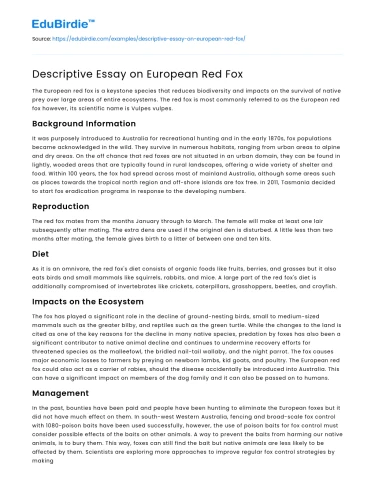The European red fox is a keystone species that reduces biodiversity and impacts on the survival of native prey over large areas of entire ecosystems. The red fox is most commonly referred to as the European red fox however, its scientific name is Vulpes vulpes.
Background Information
It was purposely introduced to Australia for recreational hunting and in the early 1870s, fox populations became acknowledged in the wild. They survive in numerous habitats, ranging from urban areas to alpine and dry areas. On the off chance that red foxes are not situated in an urban domain, they can be found in lightly, wooded areas that are typically found in rural landscapes, offering a wide variety of shelter and food. Within 100 years, the fox had spread across most of mainland Australia, although some areas such as places towards the tropical north region and off-shore islands are fox free. In 2011, Tasmania decided to start fox eradication programs in response to the developing numbers.
Save your time!
We can take care of your essay
- Proper editing and formatting
- Free revision, title page, and bibliography
- Flexible prices and money-back guarantee
Reproduction
The red fox mates from the months January through to March. The female will make at least one lair subsequently after mating. The extra dens are used if the original den is disturbed. A little less than two months after mating, the female gives birth to a litter of between one and ten kits.
Diet
As it is an omnivore, the red fox's diet consists of organic foods like fruits, berries, and grasses but it also eats birds and small mammals like squirrels, rabbits, and mice. A large part of the red fox's diet is additionally compromised of invertebrates like crickets, caterpillars, grasshoppers, beetles, and crayfish.
Impacts on the Ecosystem
The fox has played a significant role in the decline of ground-nesting birds, small to medium-sized mammals such as the greater bilby, and reptiles such as the green turtle. While the changes to the land is cited as one of the key reasons for the decline in many native species, predation by foxes has also been a significant contributor to native animal decline and continues to undermine recovery efforts for threatened species as the malleefowl, the bridled nail-tail wallaby, and the night parrot. The fox causes major economic losses to farmers by preying on newborn lambs, kid goats, and poultry. The European red fox could also act as a carrier of rabies, should the disease accidentally be introduced into Australia. This can have a significant impact on members of the dog family and it can also be passed on to humans.
Management
In the past, bounties have been paid and people have been hunting to eliminate the European foxes but it did not have much effect on them. In south-west Western Australia, fencing and broad-scale fox control with 1080-poison baits have been used successfully, however, the use of poison baits for fox control must consider possible effects of the baits on other animals. A way to prevent the baits from harming our native animals, is to bury them. This way, foxes can still find the bait but native animals are less likely to be affected by them. Scientists are exploring more approaches to improve regular fox control strategies by making them more humane, and less likely to harm non-target animals. It is known that foxes are less common where dingoes are present, which be another form of biological control. Researches are actively looking at their interactions, and their findings could help to integrate fox control.
Conclusion
Overall, the European red fox may be one of the most destructive species ever introduced to Queensland, and all of Australia. However, scientists are looking for ways to reduce their impacts in the future and this will be momentous in helping us move forward. It’s time that we took responsibility in managing this species, before it becomes irreversible.






 Stuck on your essay?
Stuck on your essay?

